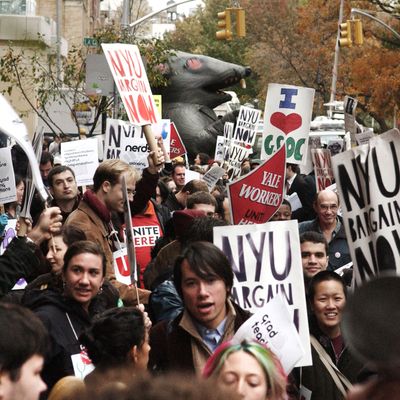
On Tuesday, the National Labor Relations Board decided that the strange, broke, sleep-deprived, jargon-drunk slice of humanity we call “graduate students” have a right to form unions. More precisely, the NLRB ruled that graduate students who work as research or teaching assistants at private colleges qualify as university employees, entitled to the collective bargaining rights that come with that designation.
The decision will not affect the larger body of students who work at public universities, as those schools’ labor rules are governed by state law. Which means, it really won’t impact very many people at all: According to The Wall Street Journal, roughly 535,000 graduate students are currently enrolled at private colleges. The number who are both employed by those colleges — and interested in taking time away from their studies to pursue class solidarity — is considerably smaller.
So, if you aren’t currently making $19,000 a year to teach three sections of an intro class (or else a student in one such graduate-student-taught section who is sick of the malnourished instructor eyeing your granola bar with homicidal lust), you may wonder why this decision qualifies as a “big deal.” After all, graduate students have a habit of, well, graduating. How important or influential could unions with such a small number of workers — and such a high level of turnover — actually be?
There are a couple of responses to this point. One, voiced by the decision’s detractors, is that graduate student unions have the potential to transform higher education. These unions could ostensibly negotiate over the length of classes, the amount of grading, or what gets included in syllabi. According to the briefs submitted by Ivy League universities, such cabals would eventually undermine the historic missions of America’s most prestigious universities.
But, as the NLRB noted, these alarmist claims are undercut by the fact that 68,000 American graduate students are already unionized, and the universities that negotiate with them seem to be doing just fine.
The more compelling argument for the ruling’s significance is that it will provide a much-needed growth opportunity to the broader American labor movement. To survive long-term, our nation’s unions will need to expand their presence in the service sectors, both “pink” and “white” collar. The movement has made progress on that front in recent years, organizing lawyers, digital journalists, and college professors. As Vox’s Libby Nelson notes, unionized graduate students could serve as spores of white-collar solidarity, raising class consciousness in a variety of workplaces as they disperse across the professions:
Graduate students won’t be students forever. (That’s one reason colleges argued they should not be allowed to organize — an argument the NLRB discarded.) Eventually, they’ll get jobs in academia or in other fields, and they’ll come with union affiliations and affinities they might not have otherwise had. So allowing teaching and research assistants to organize isn’t just a short-term growth opportunity for the labor movement but a long-term one as well.
The ruling could also advance the cause of unionization among college athletes. The NLRB declined to rule on the Northwestern football team’s union drive, arguing that the unionization of a single college team would destabilize intercollegiate football conferences. But their new ruling eliminates one argument the school made against its players — if graduate students aren’t employees, than neither are athletes.
Whatever one thinks of graduate student unionization, the NLRB’s ruling offers yet another illustration of why it really matters which of our two major parties controls the executive branch. In 2004, the Bush administration’s NLRB decided that Brown university graduate students had no right to unionize. The prestigious institutions who opposed the board’s new ruling will doubtlessly continue to press their case. And it’s very likely that the next Republican administration would appoint an NLRB eager to hear them out.






























